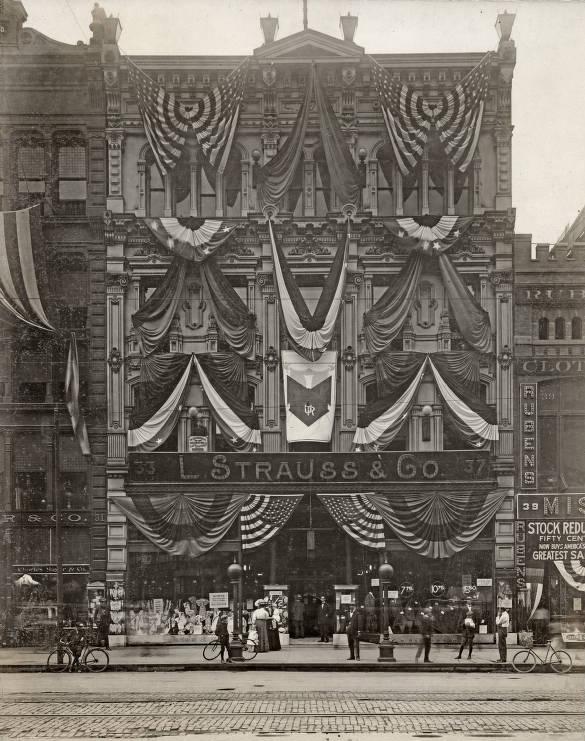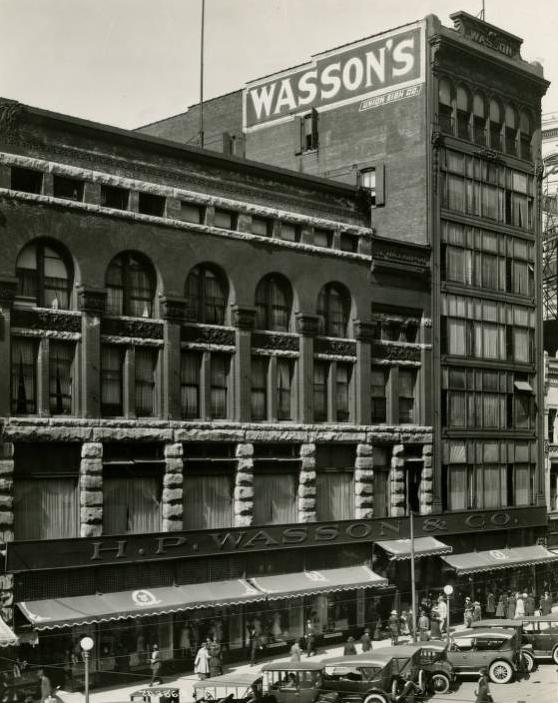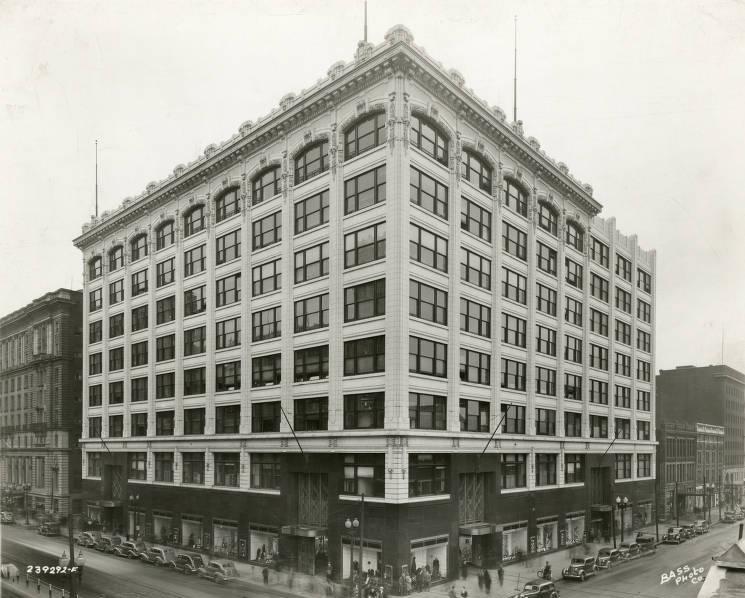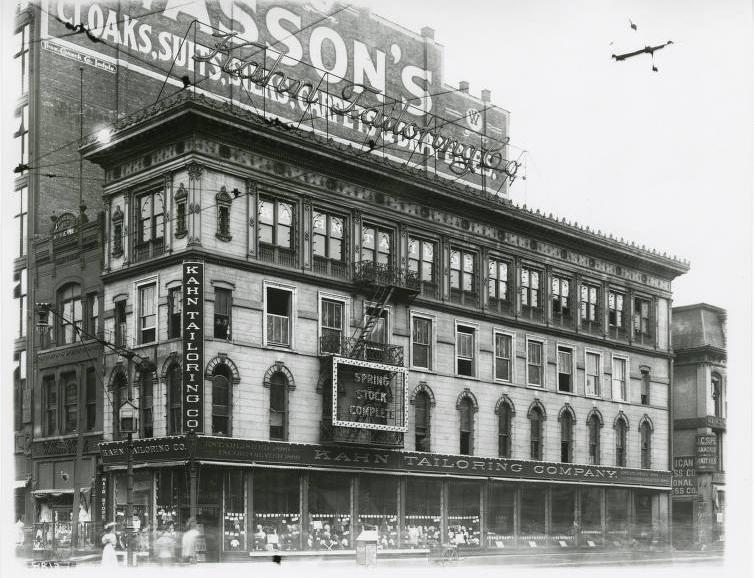The first Jewish immigrants to come to Indianapolis arrived in 1849 and settled on the south side of the city. Before immigrating to the United States, many of these individuals made their living through door-to-door retail trade or as tailors. Once here, many Jewish immigrants continued this type of work by becoming traveling peddlers or tailors and later running their own small shops within their community in Indianapolis. By 1860, more than half of all clothing and tailoring businesses in Indianapolis were Jewish owned, making Jewish residents of Indianapolis significant players in shaping the city’s economy. This was most evident in the growth of Indianapolis department stores in the mid-19th century.
Due to the rise of urbanization, mass transport, and mass production in the mid-1800s, many small dry-goods store owners were able to grow their businesses into large and lavish department stores with curated products, personal services, and restaurants. During this time, Indianapolis became home to several department stores, many of which were founded by Jewish citizens. In fact, two of the top three department stores in the city, and , were Jewish-owned. Other large Jewish-owned businesses during this time included and .

L. STRAUSS & COMPANY (1853–1993)
L. Strauss & Company was known for selling high quality, high-cost clothing, shoes, and accessories for men and women. The department store grew out of the Eagle Clothing Company on Washington Street. Eagle Clothing Company was founded in 1853 by Jewish tailor Max Dernham and German clothier John Gramling. In 1879, Leopold Strauss, a Jewish immigrant from Germany who had been working at the store for several years, bought out the then-current owner’s interest in the store. He renamed the store L. Strauss & Company in 1899 and incorporated the company in 1908. Strauss retired four years later, but the store continued serving Indianapolis for nearly a century.
H. P. WASSON & COMPANY (1883–1981)

H. P. Wasson & Company catered to middle-class customers, selling quality home goods such as kitchenware, appliances, and clothing at lower prices. The department store was founded by Hiram Passmore Wasson in 1883. In the early 1910s the owners of the Star Store, and Louis P. Wolf took over the department store. Efroymson was born to Jewish immigrants from Eastern Europe and Wolf was an immigrant from Germany who operated a dry goods pushcart in the city’s Jewish neighborhoods before partnering with Gustave Efroymson to open the Star Store.
Wasson & Company lasted for nearly a century, during which time it made Indianapolis history by becoming the first fully air-conditioned department store (mid-1930s), expanding multiple times including a branch in the Eastgate Shopping Center (see ), allowing customers to make their own selections (a novelty started in the 1950s), and developing a discount store after rebranding as Wasson’s–Goldblatt’s (1970s).
WILLIAM H. BLOCK COMPANY (1896–ca. 1980s)
, a Jewish immigrant from the Austria–Hungary region who began his career by selling linens door-to-door, founded William H. Block Company in 1896 (incorporated in 1907). By the 1930s, the massive 8-story department store featured multiple restaurants, the James Whitcomb Riley fountain room, and a 700-seat auditorium used to promote the civic, social, and cultural interests of the city. More importantly, however, Block’s store was known for employing people regardless of race or creed.

Block’s department store lasted over a century, growing steadily until the national decline of department stores in the mid-20th century. It was one of the first department stores to branch out to the suburbs of Indianapolis—the first branch opened in in 1954, and the Southern Plaza branch (1961) included a basement store where working and middle-class customers could purchase goods for cut-rate prices. The Block legacy ended after Federated Department Stores Inc. acquired the 10-store Block’s chain and converted them to Lazarus stores in the late 1980s.
KAHN TAILORING COMPANY (1903–ca. 1970)
Kahn Tailoring Company was one of Indianapolis’ largest clothing manufacturers and had a reputation for providing high-quality clothing. Henry Kahn, the son of a tailor and Jewish immigrant from France, started a small tailoring business in 1886, but did not found Kahn Tailoring Company until 1903. After being awarded a contract to provide military uniforms to troops in , Kahn’s became one of the largest ready-made and custom tailoring operations with a focus on men’s suits and military uniforms. By 1947, the clothing manufacturer had 12 outlets from Los Angeles to Washington, D.C. and supplied over 2,000 dealers.

While Kahn’s had national reach, its true impact was on the Jewish community in Indianapolis. Kahn actively recruited Jewish immigrants and provided his employees with important benefits including health care, a night school, and a social welfare office. Because of those efforts, the company became one of the largest employers of Indianapolis’ Jewish immigrants, particularly Sephardic Jews and women.
FURTHER READING
- Hoosier History Live. “Block’s, Wasson’s and Strauss: Bygone Major Retailers in Indy,” March 26, 2022. https://hoosierhistorylive.org/mail/2022-03-26.html.
- Turchi, Kenneth L. Looking forward, giving back: The Jewish merchants of Downtown Indianapolis. Indianapolis: Indiana Historical Society Press, 2021. https://search.worldcat.org/en/title/1238128573.
CITE THIS ENTRY
APA:
Fischer, J. (2025). Jewish Merchants. Encyclopedia of Indianapolis. Retrieved Feb 21, 2026, from https://indyencyclopedia.org/jewish-merchants/.
MLA:
Fischer, Jessica Erin. “Jewish Merchants.” Encyclopedia of Indianapolis, 2025, https://indyencyclopedia.org/jewish-merchants/. Accessed 21 Feb 2026.
Chicago:
Fischer, Jessica Erin. “Jewish Merchants.” Encyclopedia of Indianapolis, 2025. Accessed Feb 21, 2026. https://indyencyclopedia.org/jewish-merchants/.

Help improve this entry
Contribute information, offer corrections, suggest images.
You can also recommend new entries related to this topic.